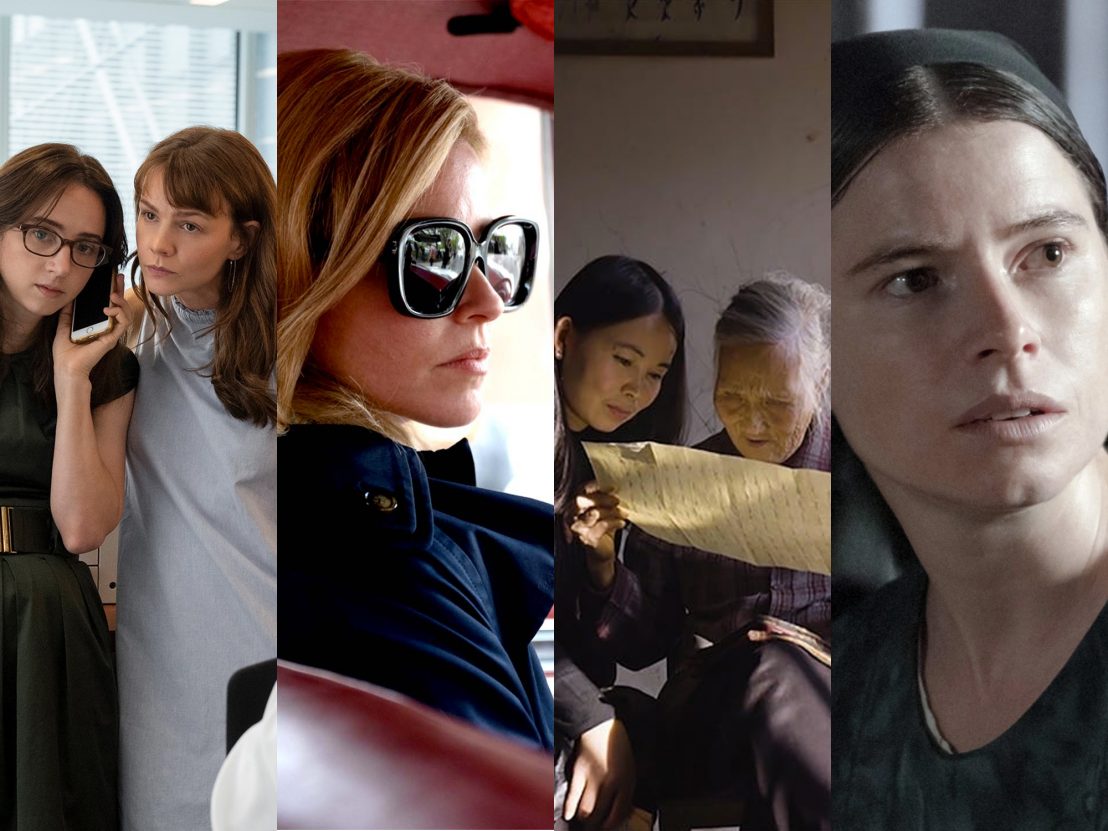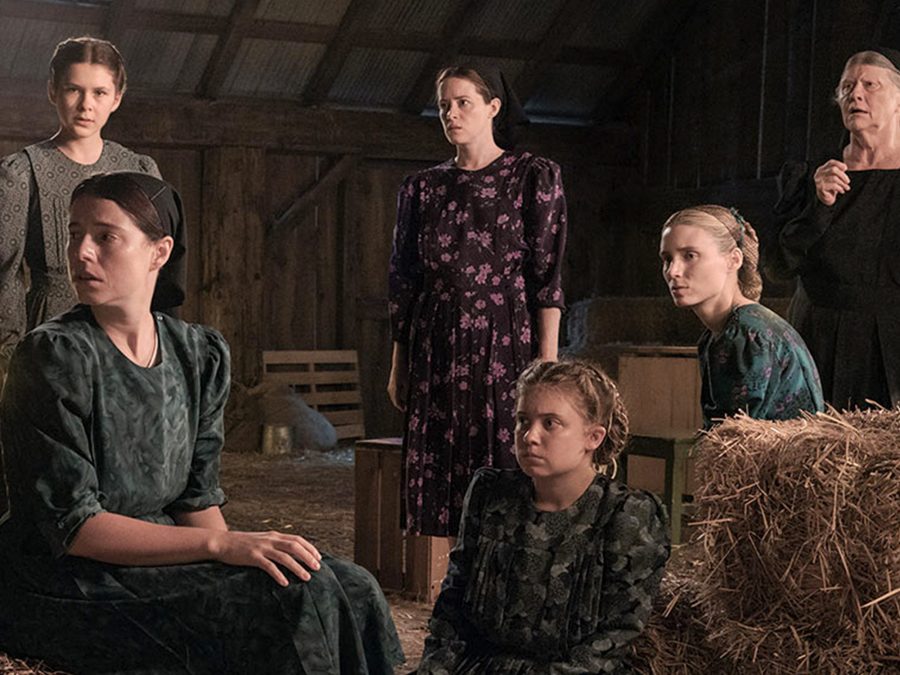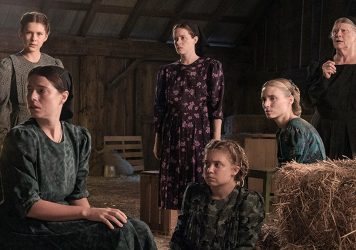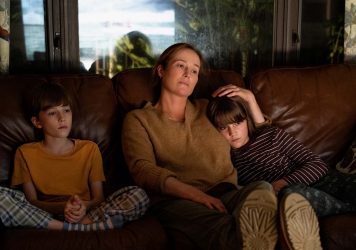
Major awards season movies often can’t intentionally react to the moment in which they end up releasing – their conception and production phases are simply much too long – but they can find an unexpected resonance regardless. At the 2022 London Film Festival, three major awards season hopefuls and a niche documentary – Phyllis Nagy’s Call Jane, Sarah Polley’s Women Talking, Maria Schraeder’s She Said, and Violet Du Feng’s Hidden Letters respectively – all provided complimentary examinations on the concept of “whisper networks;” an informal network of private information exchanged between women in secretive circles for their own protection.
Whilst She Said, Women Talking and Hidden Letters have whisper networks relating to abusers, Nagy’s Call Jane centres on the one which helped propagate a safe underground abortion network in the 1970s. Joy (Elizabeth Banks) is a traditional centrist American housewife who, due to life-threatening complications with her latest pregnancy that leave her with no other legal places to turn, falls into the Chicago Jane collective, initially to get her own abortion but soon after as a key member of the team helping to bolster the organisational side of the group. In doing so, she finds a sense of purpose long since forgotten thanks to the era’s forced domesticity.
Joy is introduced to the group after spotting a non-descript flyer with a telephone number attached to a lamp post outside of a much sketchier back-alley abortion site. The flyer has no specific information regarding who “Jane” is or what she provides, but with language coded enough for pregnant women to recognise what the service is offering. It’s one run by women – even the abortions are performed by women, in a sort of proto-matriarchy, albeit one which actively struggles at racial and financial inclusivity.
In the process, the Jane network also helps to destigmatise abortion in the minds of those women who require the surgery, providing an education that the patriarchy of America of the time refused to. Call Jane frequently mentions the risk that all those involved with this ring are taking and the necessity of the indiscretion, although Nagy’s film only dramatizes it for one scene where a detective shows up Joy’s door inquiring about the Jane network. It turns out he’s asking with plausible deniability for help getting his partner an abortion.
By contrast, Polley’s Women Talking has an ever-present deadline looming overhead. In an isolated Mennonite commune, eight women gather in a barn to discuss the revelation that they’ve been drugged and raped for years by the men in their community, attempting to decide their best course of action before the men return in two days’ time. What starts as a cathartic release in the acknowledgment of a shared experience – the men had insisted that demons and devils were responsible – quickly gives way to philosophical disagreements over what the best course of action to take may be, and the individual differences in how each woman processes this trauma.
Whilst these conversations between the women get heated, they never become actively uncivil, and the differences of opinion help reinforce the important message that trauma is not a monolith.

Each woman has differing ideas on whether to forgive their abusers, whether to enact righteous vengeance, whether to run or whether to fight, all informed by their individual beliefs and philosophical worldviews. But the ability to talk with each other physically, to receive reassurance that their pain is valid, in a safe space free from the immediate risk of retaliation (so long as a course of action is decided before the men return) nonetheless bonds them. Being able to vent and be heard rather than having to bottle up or process alone (particularly since their colony forbids them from learning to read or write) is a new experience for the women.
Du Feng’s documentary Hidden Letters shines a light on the long history of such a practice. Revolving around the ancient secretive Chinese language of Nushu, created to circumvent the fact that the women of Ancient China were forbidden to read or write, they would commune with each other in this long-forgotten dialect as a way to express the pain of abusive constrictive control they went through every single day. It’s a sad, lyrical language which is still capable of connecting with Chinese women to this day; the documentary’s subjects Hu Xin, a museum guide and ambassador for Nushu, and Simu, a musician and artist, are each drawn to its cathartic expression of deep pain and dissatisfaction as they chafe against their own traditional patriarchal restrictions.
However, both women’s efforts to raise awareness of the language in Chinese culture have also seen – against their wishes – this specific and emotionally painful whisper network be gradually perverted and sold out by that patriarchy. Du Feng’s film features infuriating scenes of men trying to tell women drawing the script that it should look pretty, the Ministry of Culture co-opting its aesthetics to sell a faux-progressive narrative of Chinese society, and even utilising this unique feminine language to hawk KFC and potatoes in spite of the women in such meetings’ vehement objections. A safe, uniquely female form of communication which, once exposed to the very men it was supposed to hide from, is subjected to cultural vandalism, its meaning and radicalism gradually being chipped away.
If Hidden Letters depicts the risks in a whisper network going overground, where the lessons and wisdom they can provide are ignored or bastardised by the patriarchal powers that be, Schraeder’s She Said demonstrates why sometimes that risk has to be taken. A dramatization of The New York Times’ investigation into Harvey Weinstein’s history of sexual abuse, headed up by journalists Jodi Kantor (Zoe Kazan) and Megan Twohey (Carey Mulligan), the film demonstrates in frustrating and scary detail just how dominating the culture of fear that Weinstein’s power cultivated over his victims. Kantor and Twohey have little trouble finding women who were abused by Weinstein – several of them even mention having informally passed or been passed down advice and warnings regarding working with Weinstein in hopes that they might protect others from his abuse. But getting them to go on the record proves significantly tougher, nearly-impossible at times, due to his then domineering (and often industry-supported) control and very real actionable threats of legal ruin.
For all these underground attempts to protect other women, Weinstein’s destruction of so many lives continued unabated. There is a limit to the extent that the victims’ efforts of self-education and warnings could effect change or help others, particularly in an industry so incestuously linked that one wrong word from Weinstein could end their careers in addition to that trauma. In situations such as these, She Said argues, it’s important for those in positions of power to aid these women by believing their stories and protecting them when they choose to speak up on a public stage.
Once they do and that protection is in place, as happens with Ashley Judd and Laura Madden in that initial article, then the floodgates open and significantly more women feel safer speaking out against their abusers and taking back control of their narrative. The cathartic release with which She Said’s filmmaking realises that moment is a gigantic statement for the necessity in such cases for underground whisper networks to cross overground.
Those films were developed and commissioned as far back as 2017, when the #MeToo movement regarding the entertainment industry’s laundry list of alleged abusers went mainstream, but now release as the misogynistic backlash to such movements hits a dispiriting high. Amber Heard’s character assassination. A similar cult-like attempt to downplay Angelina Jolie’s accusations of child abuse against Brad Pitt – who, ironically or shrewdly, is a producer on both Women Talking and She Said. Shia LaBeouf’s latest attempt to rewrite his image. Arcade Fire’s Win Butler being outed as an alleged serial predator and many fans simply not caring…It really does feel like we’re hitting a major regression in the wider public discourse regarding holding men to account and protecting women.
What these four movies demonstrate, in their own complimentary ways, is the continued depressingly vital necessity of whisper networks amongst women. All are, in one way or another, period pieces but all speak to the present cultural moment. When wider society fails to believe or help women, they remain forced to help themselves.
Published 4 Jan 2023

A group of women meet in secret to discuss escaping their abusive, isolated colony in Sarah Polley's adaptation of Miriam Towes' novel.

By Leila Latif
Chicago's Underground Abortion Network and a housewife's unwanted pregnancy lie at the centre of Phyllis Nagy's directorial debut.

Maria Schrader tackles the New York Times investigation that brought down Harvey Weinstein in this well-pitched drama.